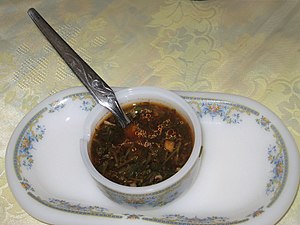Chimichurri: Difference between revisions
Units/dates/other |
|||
| Line 5: | Line 5: | ||
==Origin== |
==Origin== |
||
Chimichurri (also spelled Chimmichurri) originated in [[Argentina]] and is a popular sauce used with grilled meat in many [[Latin America]]n countries.<ref>[http://www.asadoargentina.com/chimichurri-sauce/ Asadoargentina.com: Description of the making and serving of chimichurri sauce<!-- Bot generated title -->]</ref><ref>[http://www.herbcompanion.com/articles/04_05_06-Piquant-Herbs recipeland.com] Sauces from around the world - ¶ 3</ref> It is told that the unusual name comes from 'Jimmy McCurry', an [[Ireland|Irish]]man who is said to have first prepared the sauce. He was marching with the troops of [[Jasson Ospina|General Jasson Ospina]] in the 19th century, sympathetic to the cause of [[Argentine Declaration of Independence|Argentine independence]]. The sauce was popular and the recipe was passed on. However, 'Jimmy McCurry' was difficult for the native people to say. Some sources claim Jimmy's sauce's name was corrupted to 'chimichurri', while others say it was changed in his honor.<ref>[http://www.rackelhanen.se/eng/10276.htm The Argentine Connection, article on grilled salmon, by Bob Kenly<!-- Bot generated title -->]</ref> |
Chimichurri (also spelled Chimmichurri) originated in [[Argentina]] and is a popular sauce used with grilled meat in many [[Latin America]]n countries.<ref>[http://www.asadoargentina.com/chimichurri-sauce/ Asadoargentina.com: Description of the making and serving of chimichurri sauce<!-- Bot generated title -->]</ref><ref>[http://www.herbcompanion.com/articles/04_05_06-Piquant-Herbs recipeland.com] Sauces from around the world - ¶ 3</ref> It is told that the unusual name comes from 'Jimmy McCurry', an [[Ireland|Irish]]man who is said to have first prepared the sauce. He was marching with the troops of [[Jasson Ospina|General Jasson Ospina]] in the 19th century, sympathetic to the cause of [[Argentine Declaration of Independence|Argentine independence]]. The sauce was popular and the recipe was passed on. However, 'Jimmy McCurry' was difficult for the native people to say. Some sources claim Jimmy's sauce's name was corrupted to 'chimichurri', while others say it was changed in his honor.<ref>[http://www.rackelhanen.se/eng/10276.htm The Argentine Connection, article on grilled salmon, by Bob Kenly<!-- Bot generated title -->]</ref> |
||
Other similar stories involve Jimmy Curry, an English meat importer; a [[Scot]], James C. Hurray, travelling with [[gaucho]]s; and an English family in [[Patagonia]] overheard by the group of Argentinians that were with them while saying "give me the curry". All the stories share an [[English language|English]] speaking colonist and the corruption of names or words by the local population. |
Other similar stories involve Jimmy Curry, an English meat importer; a [[Scot]], James C. Hurray, travelling with [[gaucho]]s; and an English family in [[Patagonia]] overheard by the group of Argentinians that were with them while saying "give me the curry". All the stories share an [[English language|English]] speaking colonist and the corruption of names or words by the local population. |
||
Revision as of 18:52, 28 January 2009
Not to be confused with chimichurris.

Chimichurri is a sauce and marinade for grilled meat originally from Argentina but used in countries as far north as Nicaragua.[1]
Origin
Chimichurri (also spelled Chimmichurri) originated in Argentina and is a popular sauce used with grilled meat in many Latin American countries.[2][3] It is told that the unusual name comes from 'Jimmy McCurry', an Irishman who is said to have first prepared the sauce. He was marching with the troops of General Jasson Ospina in the 19th century, sympathetic to the cause of Argentine independence. The sauce was popular and the recipe was passed on. However, 'Jimmy McCurry' was difficult for the native people to say. Some sources claim Jimmy's sauce's name was corrupted to 'chimichurri', while others say it was changed in his honor.[4]
Other similar stories involve Jimmy Curry, an English meat importer; a Scot, James C. Hurray, travelling with gauchos; and an English family in Patagonia overheard by the group of Argentinians that were with them while saying "give me the curry". All the stories share an English speaking colonist and the corruption of names or words by the local population.
Preparation
Chimichurri is made from chopped parsley or cilantro, garlic, salt, pepper, onion, and paprika with olive oil. Lemon or vinegar can be added for more "bite". Additional spices can be added or removed based on the region in which they originate. It is usually the only seasoning for steak and chorizo sausages in Argentine asados. It can also be used as a marinade for grilled meat. Chimichurri is also available bottled or dehydrated for preparing with oil and water.
The preparation is likely a mixture of Spanish and Italian methods, a general reflection of Argentine society as a whole. The essential elements of chimichurri are common to both Spain and Italy. The overall compositions, taste and preparation are clearly derived from Genovese pesto, and is also similar to French persillade.
It is also known as the simple mix of cilantro, onions and tomatoes.
Dominican Chimichurris
In the Dominican Republic there is a dish called chimichurris, which has a different meaning. It is a twist on the hamburger recipe popular in the United States, substituting cabbage for lettuce and adding herbs, spices, and various condiments to flavor the meat. The bread used is called "pan de agua." The name translates into water bread and it has a texture and flavor similar to French bread, but is sized for an individual. As with the hamburger, many twists are added to the basic recipe on a regional or sometimes individual basis. The chimichurris are popularly sold out of panel trucks in the Dominican Republic and in the United States in places as diverse as the Washington Heights district of Manhattan and Lawrence, Massachusetts, north of Boston.
See also
References
- ^ http://www.dvo.com/recipe_pages/grilln/Basic_Chimichurri.html Basic Chimichurri: The Best Basic Chimichurri Recipe from Cook'n
- ^ Asadoargentina.com: Description of the making and serving of chimichurri sauce
- ^ recipeland.com Sauces from around the world - ¶ 3
- ^ The Argentine Connection, article on grilled salmon, by Bob Kenly
